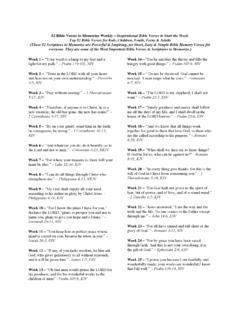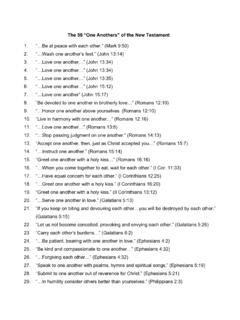Transcription of How to Analyze a Bible Passage - B&H Publishing Group
1 How to Analyze a Bible PassageThe kind of study that can help you examine a small Passage of Scripture is called ana-lytical Bible study. Analytical Bible study gives you a detailed view of a Bible book. Here the words, sentences, and paragraphs become important. The prayers, commands, and promises of Scripture have new meaning. We get this view of the Bible by slow, deliberate study with close observation. This Bible -study method makes the details of a Bible Passage become Bible study consists of five elements:1. Write a Use observations and Summarize the Make a Apply the s study and practice using each of these a ParaphraseThere are four steps in paraphrasing a Scripture Select a section for analysis. If you are going to study, teach, or speak on a Scripture Passage , it is best to use a paragraph of Scripture, since a paragraph is the basic unit of Read the section several times in different Bible versions.
2 As you read the paragraph, notice the main verbs used in the sentences. Observe whether they indicate statements, exclamations, questions, or commands. Observe important nouns in the sentences and what they mean. Carefully note any words or phrases that modify the nouns. The modifiers provide infor-mation you can use in a Write the section in your own words. Don t copy the words of a modern translation or a para-phrase. Express the biblical writer s thoughts, attitudes, and purposes as you understand them. Use modern English words. You may use several words to say what a biblical writer has said in a few words. Be careful to maintain the meaning of the Check your paraphrase against a modern translation. You may learn that your paraphrase has brought out a different idea from the translation you have consulted.
3 If this is true, you may have given the verse the wrong meaning. Revise your paraphrase after checking it with other Philippians 4:4-7. On the chart Analytical Bible Study on the next page, follow the four steps you have read to write a paraphrase of these verses in the column Paraphrase. How to Analyze a Bible PassagePage 1 of 10 How to Analyze a Bible PassageAnalytical Bible StudyParaphraseObservations and QuestionsSummaryComparisonApplicationPag e 2 of 10 How to Analyze a Bible PassageHere are some problems we identified in paraphrasing Philippians 4:4-7. Check to see whether your paraphrase addressed these concerns. The verbs in verses 4-7 are commands except for the promise in verse 7. Obeying the com-mand in verse 6 is a prerequisite to experiencing the promise in verse 7. The King James Version uses the word moderation in verse 5.
4 Can you find a word that expresses the thought more accurately? Can you find three words for prayer in verse 6? How would you define God s peace as it is used in verse 7? What did Paul mean by heart and mind in verse 7?The purpose of writing a paraphrase is to help you understand what the author is saying. A paraphrase is the best way to discover the biblical writer s ideas and thoughts. As the begin-ning point for analytical Bible study, a paraphrase will help you complete the other parts of analytical study more Observations and QuestionsYou have practiced paraphrasing Philippians 4:4-7. Now you are ready to make observations and ask questions about the Passage . One way to Analyze a Bible Passage more deeply is to ask questions. You might ask, Who? Who wrote this material? Who are the characters involved? For whom is the Passage intended?
5 You might ask the question What? What is happening in the text? What does it say to us? Why? is another good question. Why did the writer say these things, and in what context were they written? So what? may be the most important question of all. What difference does this Passage make to people today?Asking questions about the Passage stimulates your thinking and forces you to take the Bible seriously. This will help you apply its teachings more completely to your again Philippians 4:4-7. What questions would you ask to discover the meanings of these verses? Write your questions in the appropriate column on the chart Analytical Bible Study. Here are some questions we identified. How do they compare with your list? What Bible -study tool would give you the meanings of the three words for prayer in verse 6?
6 In verse 6 what practical activity does Paul challenge the Philippians to perform instead of worry? Why do we need to present the requests of verse 6 to God? Does He need the information? What is the relationship between verses 6 and 7? How would you learn the meaning of the peace of God? What does the word guard in verse 7 suggest about God s protection?Page 3 of 10 How to Analyze a Bible PassageYou can also use observations to Analyze a Bible Passage . You can observe details like the following. Key words. What do the verbs, nouns, adjectives, or adverbs mean? The type of statement. Is it offering advice, warning, exclamation, or promise? Contrasts or comparisons. What is the writer comparing or contrasting? Repetition. Are words or phrases repeated? Questions. Often a question in a Passage introduces new ideas or summaries.
7 Connectives. Look for words such as but, if, therefore, or in order that. What do they suggest about the meaning of the Passage ? Grammar. Look at verb tenses and the use of pronouns, adjectives, and adverbs. Atmosphere. What is the general tone of the Passage ? Literary form. Is it poetry, prophecy, narrative, an epistle, or a parable? General structure. How are the ideas in the Passage related to one another?What observations would be important to explore in Philippians 4:4-7? Add these to the second column of the chart Analytical Bible Study. I m sure you recorded the need to explore the meanings of key words in the Passage , Paul s imperative statements and promises, the contrast evident in verse 6, the repetition of key ideas, and the confident and deeply spiritual tone. You may have noted other details, as your observations will lead you to more questions rather than to answers.
8 These ques-tions will be of two basic You will ask questions about the meanings of certain terms, places, or statements in the You will ask questions about the meaning, significance, and application to life of what is in the your questions along with your observations. Here are some ways to answer your ques-tions about a Passage . Use a dictionary to define unfamiliar words. Read different translations to obtain the meaning of a phrase or a puzzling statement. Study other biblical passages that are cross-referenced in your study Bible . Think, study, meditate, and pray. Use a Bible -study aid such as a book on Bible culture, history, or social life. Use a commentary on a Passage only after you have struggled to arrive at your own one of these suggestions to explore a question or an observation you made about Philippians 4:4-7.
9 Write what you 4 of 10 How to Analyze a Bible PassageSummarizing the ContentAfter you have paraphrased, made observations, and asked questions about a Scripture pas-sage, you are ready to take your study a step further. Next it is helpful to write a summary of what you have learned about the Scripture Passage , based on the paraphrase, observations, and questions you have recorded. A summary helps you articulate and clarify what you have learned about the Scripture can use two methods to summarize a Passage . First, you can use the observations and questions you have recorded about the Passage to state conclusions about the Passage s meaning. Your summary states what you have learned about the Passage , what you believe the biblical writer meant, and how the Passage may be used. Make sure that your summary encompasses everything in the Passage and conveys the feeling as well as the message of the composing your own summary of Philippians 4:4-7.
10 Write it under Summary on the chart Analytical Bible Study. Your summary may have included some of the following ideas. Paul emphatically commanded the Philippians to rejoice. Their joy was to be in the Lord, and it was to be unchanging, in spite of circumstances like the one Paul found himself in. He also told them to be forbearing or gentle. A gentle person does not insist on his rights but respects others integrity. This person s fairness and sense of purpose attracts others to Christ. In verse 6 Paul was not con-tent merely to tell the Philippians not to worry. He gave them a practical activity to perform instead of worrying. They were to tell God their requests. We do not tell God our requests in order to inform Him. He already knows about our needs. We want to relieve ourselves of the anxiety they cause.










